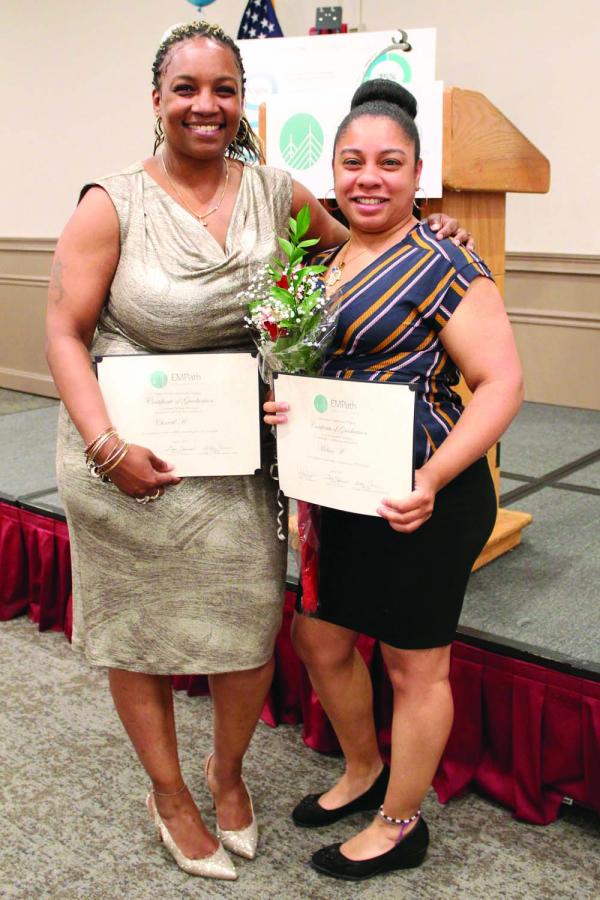June 20, 2019

Charell Hendricks and Melina Williams. Photo courtesy EMPath
A ceremony last Thursday night at Florian Hall marked the culmination of a long journey for eight women as they graduated from the Career Family Opportunity (CFO) program, the flagship five-year program offered by Economic Mobility Pathways (EMPath), a non-profit dedicated to lifting Boston families out of poverty.
For two women, Melina Williams and Charell Hendricks, the night prompted reflections on just how drastically their lives have changed in a matter of a few years.
“I forget when it’s pay day sometimes, and that is something that I thought I could only dream of – not living check to check,” said Hendricks of her now-stable financial situation. That stability is just one of the pillars of the CFO program, which uses personalized mentoring and life coaching to help individuals realize their goals and become self-sufficient and economically independent.
Judy Parks, vice president of Mobility Mentoring Programs and Services at EMPath, explained that the “holistic” scope of the program is meant to bring about permanent, sustainable progress.
“The CFO program was the pilot of this idea that, in order to help someone move out of poverty, you have to not just help them get a job or get an education, but you have to help them in all aspects of their life, in a very integrated way,” she said.
Participants in the program are paired with a “mobility mentor” who draws up a “bridge plan” to self-sufficiency, a visualization aid that helps the participant set separate career, family, and personal health goals. Other roles of mobility mentors include connecting folks with resources, services, and information they might not be aware of.
Parks, who has worked in affordable housing for more than three decades, said the single biggest problem she continues to encounter is the “deep lack of information” in poor communities. Without access to that information, she explained, “people don’t know some of the choices they could make; they don’t know some of the options they have; and they don’t have the connections that others have.” EMPath’s mobility mentors help to bridge that knowledge gap.
But, as Parks also pointed out, a big part of the battle is mental. EMPath’s approach is backed by psychological and brain science studies that delve into the effects of poverty on stress levels and mental health.
“We’ve all had those experiences where we’re under extreme stress, but it’s episodic. But for people who grow up and live in poverty, it’s the norm,” said Parks.
Relieving that stress and instilling a sense of control and agency into someone’s psyche is an important part of changing their mindset. Williams found herself in a homeless program after graduating from UMass Boston in 2015. Struggling to take care of three children, she put her dream of becoming a nurse on hold. But after being accepted to the CFO program, she says the stress of surviving gave way to a sense of belief.
“The support that I’ve had in the program was tremendous,” she said. “My mentor gave me that push to say, ‘Ok, you got this, you can do this’...EMPath basically helped me see it, see myself doing what I want to do. It was much easier to deal with my problems just visualizing that I’m already there.”
Today, she has checked off everything on her list of goals except one: a house. But after securing a better job with the help of her mentor, she has moved her family from a pest-infested public housing property to a market rate apartment. That type of upward mobility is rare in most situations like Williams,’ said Parks.
“People see welfare as the end game – it should be the beginning game,” she said. “Same with public housing. If you get into public housing, it should be a place to start, not a place to end. We’re trying to change that narrative for people.”
To measure the success of its CFO program, EMPath lays out benchmarks for its participants to reach, such as saving up a total of $10,000 for a “rainy day” fund, or getting a job in a career track that pays at least 60 percent of area median income. Hendricks has achieved both of those marks, but she points to more intangible developments, like changes in her self-perception, as truer measures of success.
“Through all the negotiation workshops and income workshops and self-worth workshops and self-care workshops, you know, through all of these things, I had the confidence to go into a room and command what I wanted and what I felt like I deserved, I had the headspace to balance family and work life so I didn’t feel like I had to give up one thing to focus on the other, and I had the vision to not be afraid to be in the system and rely on the system,” she said.
“I’m a changed person,” she added.
That level of personal growth, says Parks, is key to the program’s long-lasting effects. “It’s sustainable because it’s grounded in life changes, not just income or job changes. It’s changes in how you see yourself.”


